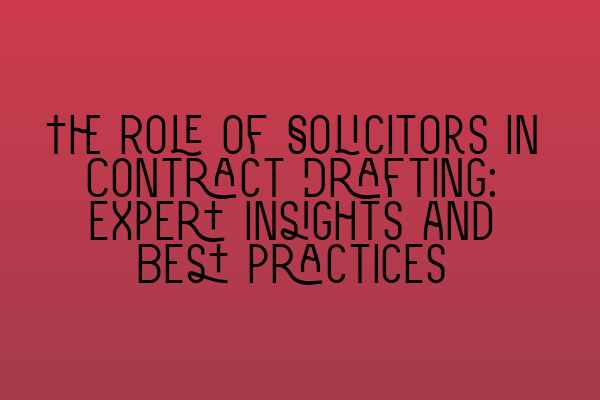The Role of Solicitors in Contract Drafting: Expert Insights and Best Practices
Introduction:
Contracts are an essential part of many legal agreements, providing a framework for parties to define their rights, obligations, and expectations. As a solicitor, contract drafting requires meticulous attention to detail, a deep understanding of the law, and the ability to effectively communicate complex legal concepts in a clear and concise manner. In this blog post, we will explore the crucial role solicitors play in contract drafting, including expert insights and best practices to ensure the creation of robust and enforceable agreements.
1. The Importance of Solicitors in Contract Drafting:
Solicitors are legal professionals who specialize in various areas of law, including contract law. Their expertise and knowledge are invaluable when it comes to drafting contracts that protect their clients’ interests and ensure legal compliance. Without solicitors, individuals and businesses may find themselves exposed to unnecessary risks and potential disputes due to poorly drafted or ambiguous contracts.
2. Understanding the Client’s Needs:
A crucial aspect of contract drafting is understanding the client’s needs and objectives. Solicitors must engage with their clients to gain a clear understanding of their goals, expectations, and the nature of the transaction or agreement. By establishing a strong client communication channel, solicitors can ensure that the final contract accurately reflects their clients’ intentions.
3. Compliance with Legal Requirements:
Contracts must comply with legal requirements, both in terms of substance and form. Solicitors are well-versed in the applicable laws and regulations governing contract formation and execution. They ensure that contracts adhere to these legal requirements, thereby minimizing the risk of unenforceability or invalidity. Compliance includes ensuring that necessary elements, such as offer, acceptance, consideration, and certainty, are present in the contract.
4. Drafting Clear and Unambiguous Terms:
One of the primary goals of contract drafting is to create clear and unambiguous terms. Ambiguities can lead to misinterpretation and disagreements between parties, potentially resulting in costly legal disputes. Solicitors use their expertise to carefully select language and terminology, ensuring that each provision is easily understood and leaves no room for confusion or different interpretations.
5. Identifying and Addressing Potential Risks:
Solicitors play a critical role in identifying and addressing potential risks when drafting contracts. They conduct a thorough analysis of the transaction, considering factors such as potential breaches, liability, and force majeure events. By foreseeing possible risks, solicitors can include appropriate clauses, such as indemnity and limitation of liability provisions, to protect their clients’ interests and mitigate potential harm.
6. Negotiating and Refining Terms:
In many cases, contract drafting involves negotiations between parties. Solicitors act as intermediaries, representing their clients’ interests and engaging in discussions to reach mutually acceptable terms. They possess excellent negotiation skills, allowing them to advocate for their clients while maintaining open lines of communication and a collaborative approach.
7. Updating Contracts to Reflect Changing Circumstances:
Contracts may need to be amended or updated over time to reflect changing circumstances or evolving legal requirements. Solicitors play a crucial role in reviewing and revising existing contracts or drafting addendums to ensure relevance and compliance. By staying up-to-date with relevant laws and industry trends, solicitors can help their clients adapt their contracts to address changing needs effectively.
Conclusion:
Solicitors play a vital role in contract drafting, ensuring the creation of legally sound and enforceable agreements. By understanding the client’s needs, complying with legal requirements, drafting clear and unambiguous terms, identifying and addressing potential risks, negotiating and refining terms, and updating contracts when necessary, solicitors provide their clients with the necessary protection and peace of mind.
If you are preparing to become a solicitor or exploring contract law further, we recommend checking out our related articles:
– SQE 1 Practice Exam Questions to test your knowledge and enhance your understanding.
– SQE 1 Practice Mocks FLK1 FLK2 to simulate the exam environment and improve your performance.
– SQE 2 Preparation Courses to enhance your skills and knowledge for the SQE 2 exam.
– SQE 1 Preparation Courses to equip yourself with the necessary tools and resources for the SQE 1 exam.
– Stay up-to-date with the SRA SQE Exam Dates to plan your study and preparation effectively.
At SQE Contract Law, we provide comprehensive resources and expert guidance to help aspiring solicitors navigate the world of contract law successfully. Contact us today to learn more and embark on a rewarding legal career path.
